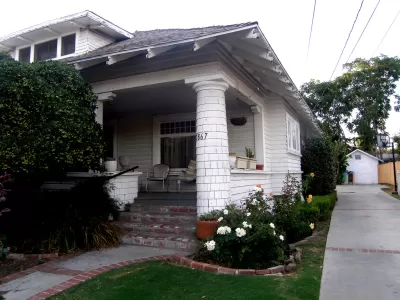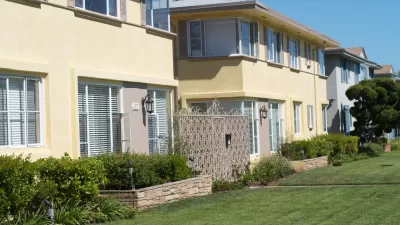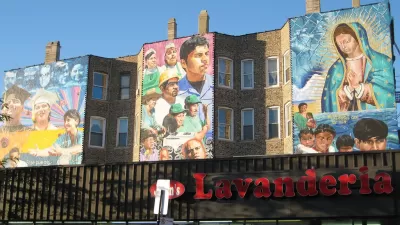The big market forces of Los Angeles long ignored Elysian Valley, colloquially called Frogtown. But now the neighborhood has hip cachet and residents are organizing to have a say as the area changes.

The phrase "riverfront property" often connotes value, but not traditionally for the Los Angeles River. But that may soon change in Elysian Valley. "Traditionally working class with a large immigrant population and, historically, a mix of residential and industrial uses, the 0.79-square-mile area has seen properties flip since the Army Corps of Engineers announced a year ago a $1-billion plan to revitalize the Los Angeles River."
Molly Strauss writes, "There's a sense in the community of losing control — that outsiders serving private interests will transform this neighborhood of about 8,900 into a place residents will no longer be able to recognize, or afford."
In response, nonprofit organization LA-Más conducted a series of public workshops called Futuro de Frogtown, designed to gather stakeholders and brainstorm ways to integrate community interests and new development. "When calling for a standstill in the face of a shifting market, a community can miss the opportunity to offer alternatives that proactively meet its needs, ultimately leaving outside forces to determine the area's outcome."
That effort has seen some success. Since the workshops began, a motion is on its way to the City Council calling for restrictions in line with "preserving and enhancing the neighborhood character" and "seeking a higher degree of compatibility of architecture and landscaping for new infill development."
However, as Strauss documents, "Futuro de Frogtown revealed that even sensitivity, thorough research, and a deep knowledge of the issues might not be enough in the face of a community's historical relationship with government and development."
In a separate article on the same subject for Next City, Alexis Stephens reports on efforts by community members to influence seemingly inevitable redevelopment in Elysian Valley, known as Frogtown. "The community of nearly 9,000 primarily working class and largely Latino and Asian residents is experiencing the same real estate development pressures experienced throughout L.A., but with an increased urgency because of an upcoming billion-dollar reinvention of the L.A. River."
Long-time residents are naturally suspicious of redevelopment. "Many older residents lived through the disruption of mid-20th-century urban planning related to the construction of the I-5 freeway, the eviction of families from Chavez Ravine in order to make way for an unrealized public housing project, and the construction of [Dodger] Stadium."
Frogtown hosts a well-established informal economy, with many small businesses operating out of homes. Rather than be driven away, "Residents expressed a desire to formalize their businesses through efforts like legalizing street vending, assisting people in applications for necessary permits, getting discounts on space rentals within new development projects, and customizing small business incubation programs."
FULL STORY: The Fight for Frogtown

Study: Maui’s Plan to Convert Vacation Rentals to Long-Term Housing Could Cause Nearly $1 Billion Economic Loss
The plan would reduce visitor accommodation by 25,% resulting in 1,900 jobs lost.

North Texas Transit Leaders Tout Benefits of TOD for Growing Region
At a summit focused on transit-oriented development, policymakers discussed how North Texas’ expanded light rail system can serve as a tool for economic growth.

Why Should We Subsidize Public Transportation?
Many public transit agencies face financial stress due to rising costs, declining fare revenue, and declining subsidies. Transit advocates must provide a strong business case for increasing public transit funding.

How Community Science Connects People, Parks, and Biodiversity
Community science engages people of all backgrounds in documenting local biodiversity, strengthening connections to nature, and contributing to global efforts like the City Nature Challenge to build a more inclusive and resilient future.

Alabama: Trump Terminates Settlements for Black Communities Harmed By Raw Sewage
Trump deemed the landmark civil rights agreement “illegal DEI and environmental justice policy.”

Dear Tesla Driver: “It’s not You, It’s Him.”
Amidst a booming bumper sticker industry, one writer offers solace to those asking, “Does this car make me look fascist?”
Urban Design for Planners 1: Software Tools
This six-course series explores essential urban design concepts using open source software and equips planners with the tools they need to participate fully in the urban design process.
Planning for Universal Design
Learn the tools for implementing Universal Design in planning regulations.
City of Santa Clarita
Ascent Environmental
Institute for Housing and Urban Development Studies (IHS)
City of Grandview
Harvard GSD Executive Education
Toledo-Lucas County Plan Commissions
Salt Lake City
NYU Wagner Graduate School of Public Service





























